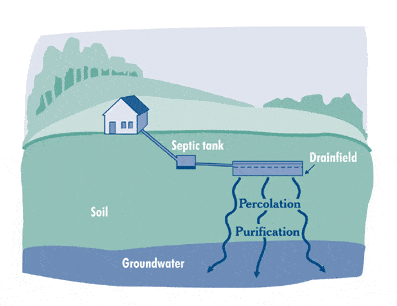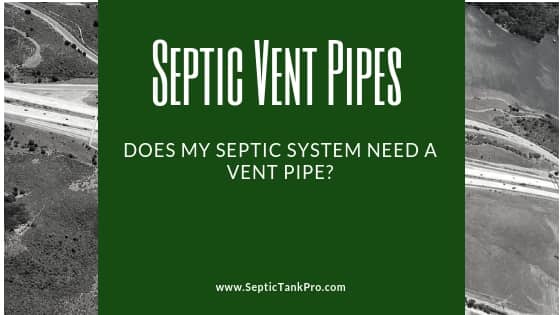Disclosure: This post contains affiliate links, meaning we may earn money or products from the companies mentioned in this post if you purchase a product through one of our links. An example would be Amazon.
Are Septic Systems Environmentally-Friendly?
Not everybody might realize this, but an on-site, dedicated septic system is actually a very environmentally-friendly option for wastewater treatment and disposal. It is quite easy to understand why so many people do not recognize the environmental benefits of a dedicated septic system. After all, the septic system is not something most property owners really think about. As long as wastewater is disposed of, whether via a centralized sewer system or on-site septic, without any negative impact on their immediate surroundings, one can simply assume that all is well. What we should all understand, though, is that both sewer systems and septic systems bear an impact on the environment.
Are septic systems environmentally-friendly? On-site, dedicated septic systems rely on a completely natural process when treating and disposing of wastewater, unlike some commercial waste treatment facilities, that use synthetic and potentially hazardous chemicals in the process. The wastewater generated in every household or business facility operating on a septic system is digested by healthy bacteria, rendering it free from pathogens and other contaminants, before it is released back to the environment. These helpful bacteria that break down the waste matter occur naturally in the environment, allowing your septic system to function as intended and keeping the community safe. No matter how much or how little you think about septic systems, the reality is that they have a number of significant environmental benefits. Here, we will discuss just some of the advantages of having your own on-site septic system that impacts both you and your community.
One of the reasons why proper waste disposal is so crucial is that domestic waste can present a disease risk to the community as a whole. Serious illnesses are spread through contaminated water and soil, and a well-functioning septic system can actually prevent this, protecting the environment and everyone in the community. Of course, the level of protection relies on the maintenance practices applied to each septic system and the quality of its components. This is why regular inspections are so crucial.
When properly situated and adequately maintained on a regular basis, septic systems are an excellent waste management option. However, when neglected, a failing septic system can cause contamination of surface and groundwater resources, leading to public health and pollution hazards. It is recommended that a septic system be submitted for an inspection once every 3 to 5 years, which is similarly a good schedule for regular pump-outs. Although, the actual frequency of pumping and inspection depend on several factors such as the tank’s age and size, number of occupants at the site, average water consumption, and others. It is best to contact a professional septic service provider to help you determine the optimal schedule for your particular on-site system.
Are Septic Systems Better than Sewer Systems When it Comes to The Environment?
Dedicated on-site septic and centralized municipal sewer systems work in similar ways. That is, utilizing beneficial microorganisms (bacteria) to filter out microbes, viruses, and other disease-causing pathogens and contaminants before releasing the safe water back into the environment.
When it comes to the sewer vs. septic system debate, the objective truth is that both systems have their pros and cons. A septic system re-cycles treated wastewater back to the area where the water was taken, recharging the water table. A municipal sewer system’s treatment plant will usually just dump treated wastewater into a river, lake, or ocean. For this reason, shorelines and coastlines near sewage treatment plants have seen upward spikes of waste matter levels, in the last 15 years alone.
Modern septic systems are far more cost-efficient and environmentally-friendly than sewage treatment systems. For installation, a septic tank can cost between $4,000 and $6,000. If it is to be installed in a less-than-ideal area, like near a water source, it may cost between $10,000 and $15,000. But with proper maintenance and regular inspections, these septic tanks can last almost indefinitely. With a centralized sewer system, on the other hand, you can expect to pay $10,000 for the piping to your house or building alone, not yet counting the fees, plant costs, permits and other charges which can tally up to as much as $30,000 just to connect to the sewer system. There will also be monthly charges ranging from $25 to $75, depending on usage.
A major advantage of a municipal sewage treatment plant is that it is run by trained personnel. In septic systems, on the other hand, the responsibility for proper installation and maintenance rest squarely on the property owner. Therefore, septic systems may not always be monitored as systematically as a municipal plant would be, potentially causing problems down the line. Septic tank systems can be beneficial to the environment only if operated and cared for properly.
Now, if either system fails, they will both require time to recover. During which, raw wastewater will still need to be disposed of. If a septic system fails, a large area will be exposed to this wastewater; but if a municipal treatment plant fails, everyone will be affected.
The real question is this: which is better for the environment, sewers or septic systems?
The easy answer is that both systems are as hygienic and sanitary as can be expected when the subject is wastewater treatment. But in either system, things can go awry, leaving humans, animals, and the environment at risk. First of all, neither system can truly handle non-biodegradable and synthetic substances that careless usage allows into drains and toilets. This includes grease, hair, female hygiene products, diapers, and hazardous chemicals. Both systems are susceptible to clogging from such items, which also have the potential to damage water tables. Also, excessive rains and flooding can overrun both types of treatment systems. The more moveable/mechanical parts there are (such as pumps), the more vulnerable to the damage they are.
The bottom line is that both sanitation systems are configured to do the job – as long as the systems are properly maintained. If you have a septic system on your property, the critical thing to remember is to regularly have the sludge and scum accumulation removed every 3 to 5 years, or as recommended by your septic service provider. Watch what you allow down your drains and toilets, too. And finally, practice conservative water usage. Observe these three basic rules and you, your family, and the environment should do just fine.
Advantages and Disadvantages of a Septic System
In general, most people seem to prefer to be on a shared sewer system if the option is available (not all areas have access). This is mainly because of the responsibility of keeping the system functional and healthy falls on the local government. Furthermore, wastewater is hauled away to a centralized treatment facility in a shared sewer system. Anybody who has ever experienced a sewage back-up or flooding on their property can truly appreciate this particular advantage of off-site wastewater treatment.
Another advantage to a shared sewer is that such full-scale systems are usually built to withstand heavy waste loads and can better accommodate periods of heavy precipitation or storm surges that might overwhelm smaller, poorly-installed or maintained dedicated septic systems. Septic systems, being on-site, would typically be significantly smaller, thus more prone to overflowing and sending contaminants to nearby surface and ground waters.
Septic systems do have their advocates, though, who firmly believe that a professionally-designed, installed and maintained septic system should be able to withstand even the biggest storms. All it takes to guarantee effective wastewater treatment is to have a skilled professional examine and confirm the presence of adequate, unsaturated, and suitable soil conditions beneath the soil treatment area in order to allow for effective wastewater percolation.
When septic systems are not properly taken care of by property owners, though, they can become a huge nuisance for the surrounding ecosystem. Inadequately-treated wastewater from a poorly-maintained septic system can contaminate surface and groundwater and expose the public to serious health risks. According to experts, improperly-treated sewage can be the main culprit behind the spread of hepatitis, dysentery, and other diseases from drinking water contaminated with pathogens, while likewise compromising natural water bodies like lakes and streams. Additionally, flies and mosquitoes that are drawn to and breed in wet areas where sewage pools on the surface can also spread infectious diseases.
5 Ways to Make Your Septic Systems More Environmentally-Friendly
People are now more conscious about “going green”; striving to be more eco-friendly wherever possible. If your property relies on a septic system, there are ways of caring for your system, keeping it functional while staying kind to the environment.
- Avoid Harsh Chemicals. As much as possible, avoid using bleach or drain cleaners with harsh chemicals when cleaning your drains and toilets. These chemicals are harmful to the natural bacteria in your septic system, deterring them from properly digesting solid waste. Aside from the harm they can inflict on your system, harsh chemicals are detrimental to the environment, especially if they seep into the groundwater. In order to maintain a healthy septic system and a balanced environment, use septic-safe and eco-friendly drain cleaners and cleaning products.
- Watch What You Flush. Waste, water, and (biodegradable) toilet paper should be the only things flushed down your toilet. Other substances that are non-biodegradable will be difficult to break down, potentially causing clogs and damage to your septic system. Non-biodegradable materials can likewise be harmful to the environment. Septic-safe and biodegradable products are the only two things finding their way into your septic.
- Disconnect Your Garbage Disposal from Your Septic System. Garbage disposal units can be quite useful, but if you are on an on-site system, the high volume of food scraps (and who knows what else are thrown on there) can be damaging to your septic system, causing clogs and other issues. Instead of using a garbage disposal unit, opt for a more environmentally-friendly disposal method, such as composting.
- Observe Conservative Water Usage. Excessive water consumption can overwork your septic system, leading to damage and possibly reducing its lifespan. Some tips include spacing out your laundry and dishwashing loads (several lighter loads over days instead of voluminous loads at one go), diverting tub, pool, and surface run-off away from your septic, and installing low-flow or water-efficient fixtures Water conservation can be very helpful to the environment, especially in areas prone to water shortages.
- Adhere to Regular System Maintenance. Regular maintenance is the best way to avoid damage to, as well as prolong the life of your system. This way, you can arrest minor issues before they escalate into bigger, more costly problems. Additionally, regular maintenance will help prevent leaking or overflowing septic tank, which can cause contamination of groundwater. Find out signs of a full septic system here.
Now that environmental pollution is at a critical level and has become a serious global concern, eco-friendly and sustainable options should always be considered first. For some of us, we fortunately now have the freedom to choose environmentally-friendly sewage treatment options. If you have not already done so, now is the time to schedule your next septic system inspection. Having your septic system, regularly inspected and maintained will certainly go a long way in preventing unexpected and unfortunate failures that can compromise you, your family, and your environment.
Find A Local Septic System Pro
Resources Used In This Article Below
https://www.quora.com/Are-septic-tanks-better-for-the-environment-than-sewer-systems
https://www.scientificamerican.com/article/earth-talk-septic/
https://blog.adbseptic.com/blog/5-ways-to-make-your-septic-system-more-eco-friendly
https://www.mrrooter.com/oneida/about-us/blog/2017/march/pros-and-cons-of-a-septic-tank-system/


